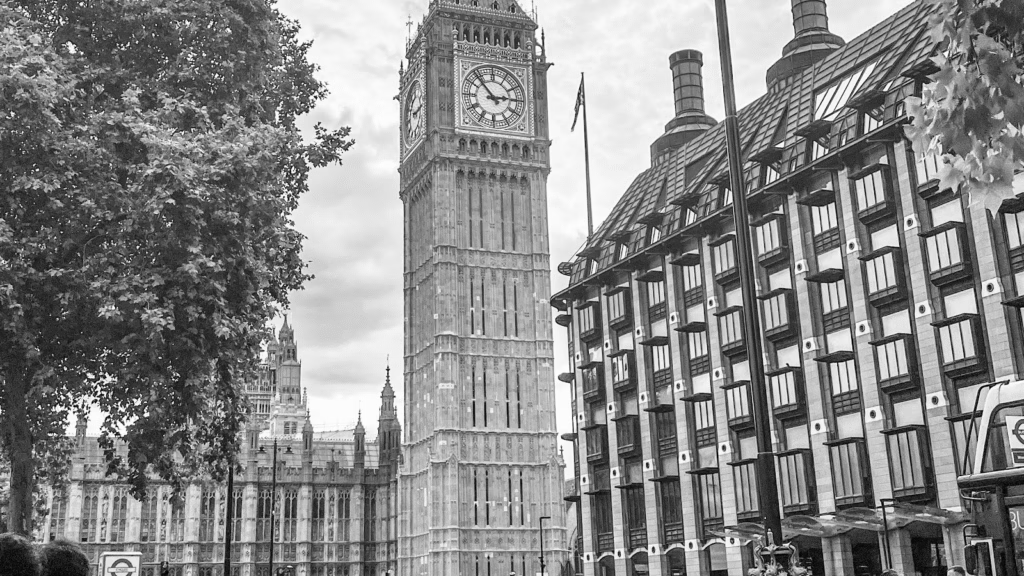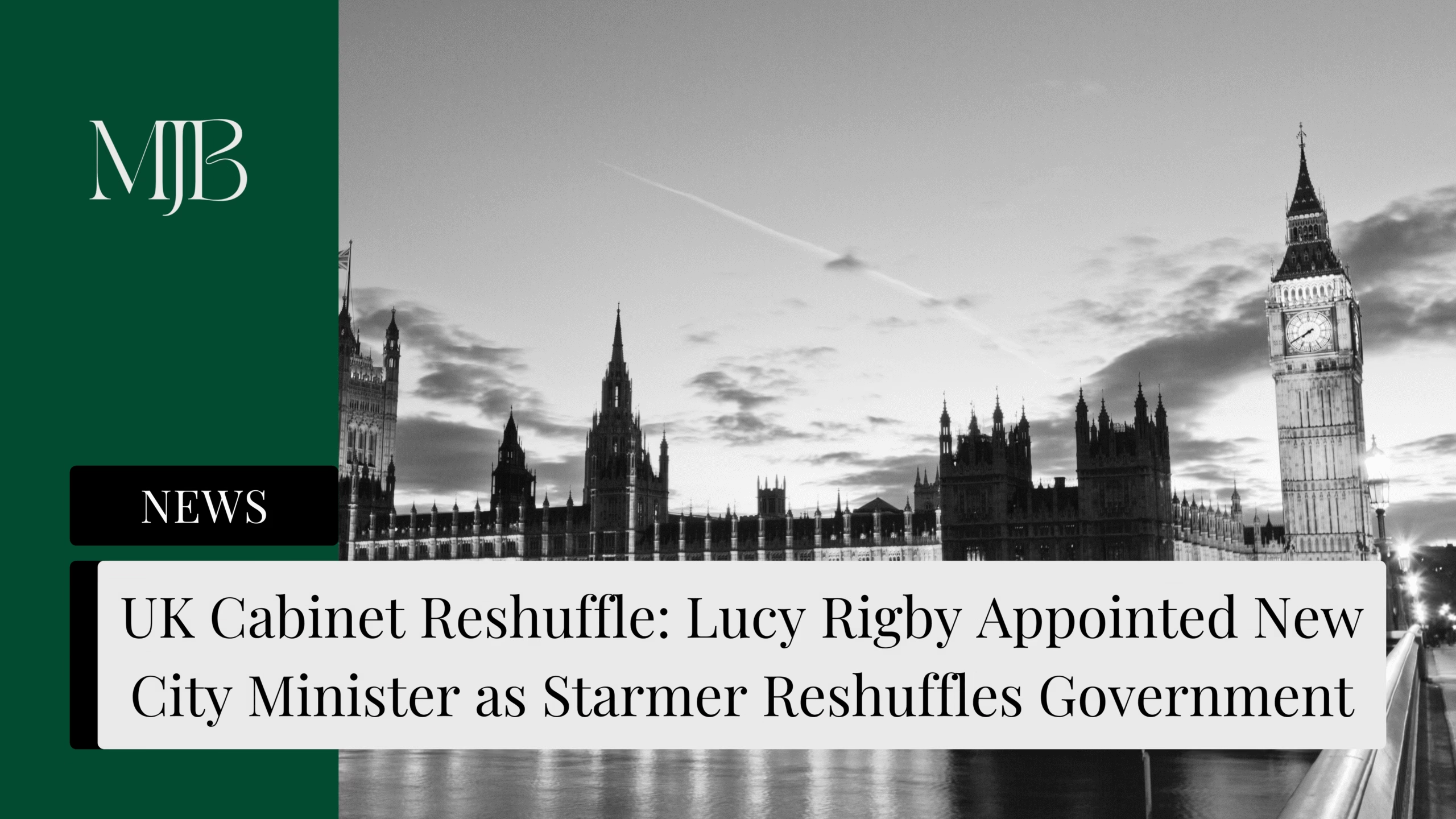Starmer’s latest cabinet reshuffle has shaken up Britain’s financial leadership. Former solicitor general Lucy Rigby has been appointed Economic Secretary to the Treasury – the coveted City minister role – while tech entrepreneur Jason Stockwood becomes the new investment minister following Poppy Gustafsson’s resignation.
The cabinet reshuffle marks what Starmer calls “phase two of his government,” though with seven ministerial departures in nearly a year, Labour’s revolving door continues spinning. Here’s what these key appointments mean for UK financial services and investment policy.
Lucy Rigby Replaces Emma Reynolds as City Minister
The new City minister appointment sees Lucy Rigby taking over from Emma Reynolds, who held the Economic Secretary to the Treasury position since July 2024. Reynolds moves to environment secretary in Starmer’s cabinet reshuffle, bringing her City lobbying background full circle.
Rigby wasted no time outlining her financial services priorities. “It’s never been so important that we harness the might of our financial services sector,” the new City minister posted on social media, targeting investment and growth across Britain.
The City minister role oversees the UK’s £2 trillion financial services sector, including banking regulation, insurance policy, asset management oversight, and financial stability measures. With London competing globally post-Brexit, Rigby’s appointment signals Labour’s commitment to maintaining the UK’s financial services dominance.

Jason Stockwood Named New Investment Minister After Gustafsson Exit
Serial entrepreneur Jason Stockwood replaces Poppy Gustafsson as investment minister, bringing extensive business experience to the role. Gustafsson, former Darktrace CEO, resigned after just 11 months citing work-life balance pressures with her young family.
Stockwood’s credentials include majority shareholder and former CEO of Grimsby Town FC, plus leadership of Simply Business. His appointment as investment minister reflects Labour’s strategy to attract private investment through business-savvy ministerial appointments.
The investment minister role has become increasingly crucial as the government seeks to boost economic growth through foreign direct investment and domestic business expansion.
Major Cabinet Reshuffle Sees Key Portfolio Swaps
Starmer’s cabinet reshuffle involves significant ministerial movements beyond the City minister and investment minister changes:
Complete Cabinet Appointments:
- David Lammy: Deputy Prime Minister and Secretary of State for Justice
- Yvette Cooper: Secretary of State for Foreign, Commonwealth and Development Affairs
- Shabana Mahmood: Secretary of State for the Home Department
- Darren Jones: Chancellor of the Duchy of Lancaster and Chief Secretary to the Prime Minister
- Pat McFadden: Secretary of State for Work and Pensions
- Steve Reed: Secretary of State for Housing, Communities and Local Government
- Peter Kyle: Secretary of State for Business and Trade and President of the Board of Trade
- Liz Kendall: Secretary of State for Science, Innovation and Technology
- Emma Reynolds: Secretary of State for Environment, Food and Rural Affairs
- Douglas Alexander: Secretary of State for Scotland
- Jonathan Reynolds: Parliamentary Secretary to the Treasury (Chief Whip)
- Sir Alan Campbell: Lord President of the Council and Leader of the House of Commons
Major Departures:
- Lucy Powell: Former Leader of the House of Commons (sacked)
- Ian Murray: Former Scotland Secretary (sacked)
Chancellor Rachel Reeves retained her Treasury role to maintain market confidence during the reshuffle period. The government prioritised financial stability while implementing these comprehensive ministerial changes.

Impact on UK Financial Services and Investment Policy
The City minister appointment comes at a critical time for UK financial services. Post-Brexit regulatory changes, international competition, and fintech innovation require skilled ministerial oversight. Rigby’s legal background and government experience position her to navigate complex financial regulation.
Stockwood’s investment minister role focuses on attracting foreign investment while supporting domestic business growth. His entrepreneurial track record could help rebuild investor confidence following recent economic challenges.
These appointments signal Labour’s emphasis on economic competitiveness and financial sector leadership as key government priorities.

Political Implications of Continued Ministerial Turnover
Seven ministerial departures in under a year raises questions about government stability. Previous exits include former Transport Secretary Louise Haigh and former City minister Tulip Siddiq, alongside investment minister Gustafsson’s recent resignation.
Angela Rayner’s departure as Deputy Prime Minister creates additional complications. Labour must now elect a new deputy leader through internal party elections, separate from Lammy’s Deputy PM appointment.
The cabinet reshuffle represents Starmer’s attempt to stabilise his government while positioning Labour for long-term economic success.
Bottom line: Fresh appointments in key economic roles demonstrate Labour’s commitment to growth, but continued ministerial turnover challenges government stability.
Frequently Asked Questions
Q1: What does the UK City minister do?
A: The City minister (Economic Secretary to the Treasury) oversees Britain’s £2 trillion financial services sector, including banking regulation, insurance policy, and asset management oversight. They serve as the government’s primary liaison with the City of London and financial institutions.
Q2: Why is the investment minister role important?
A: The investment minister leads efforts to attract foreign direct investment and support domestic business growth. They work with international investors, promote UK business opportunities, and develop policies to boost economic investment across all sectors.
Q3: How many ministers have left Starmer’s government?
A: Seven ministers have departed in nearly a year, including Angela Rayner (Deputy PM), Louise Haigh (Transport), Tulip Siddiq (former City minister), and Poppy Gustafsson (investment minister). This turnover rate exceeds typical government reshuffles.
Q4: Will these appointments affect UK financial markets?
A: Markets should remain stable as Chancellor Rachel Reeves retained her role. The new City minister and investment minister appointments bring relevant experience to their positions, potentially boosting investor confidence in Labour’s economic management.
Q5: What happens to Labour’s deputy leadership now?
A: Labour must hold internal party elections to replace Angela Rayner as deputy party leader. This position is separate from the Deputy Prime Minister role, which David Lammy now holds as a government appointment.
DISCLAIMER
Effective Date: 15th July 2025
The information provided on this website is for informational and educational purposes only and reflects the personal opinions of the author(s). It is not intended as financial, investment, tax, or legal advice.
We are not certified financial advisers. None of the content on this website constitutes a recommendation to buy, sell, or hold any financial product, asset, or service. You should not rely on any information provided here to make financial decisions.
We strongly recommend that you:
- Conduct your own research and due diligence
- Consult with a qualified financial adviser or professional before making any investment or financial decisions
While we strive to ensure that all information is accurate and up to date, we make no guarantees about the completeness, reliability, or suitability of any content on this site.
By using this website, you acknowledge and agree that we are not responsible for any financial loss, damage, or decisions made based on the content presented.






